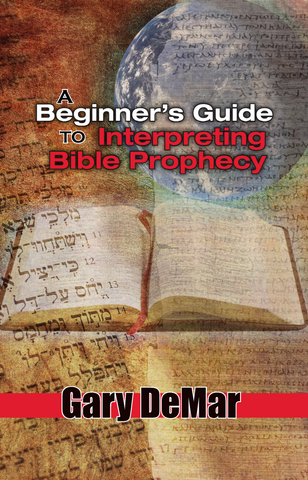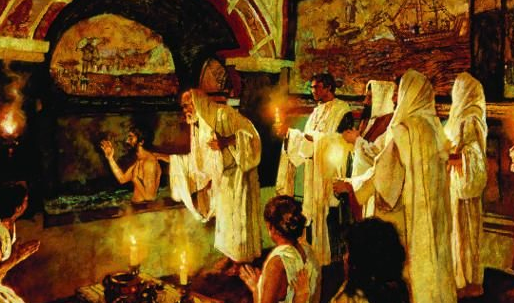For many centuries, it’s been the belief of the church that the world is waiting for a wholesale conversion of Israel that will transform the world. You can find this view in the Westminster Larger Catechism, Question and Answer 191. Romans 11:15 is often interpreted this way: “For if their rejection is the reconciliation of the world, what will their acceptance be but life from the dead?” Not all Jews rejected Jesus. Kim Burgess points out, “despite Israel’s sin of unbelief and rejection of Jesus as the Christ in that day, God will keep His promises to Israel!” God had not rejected Israel (Rom. 11:1). The promises made to Israel were being fulfilled:
But what is the divine response to him? “I have kept for Myself seven thousand men who have not bowed the knee to Baal.” In the same way then, there has also come to be at the present time [in Paul’s day] a remnant according to God’s gracious choice (11:4-5).
Was Paul describing something that was far off into the future that the world is still waiting to happen? God was reconciling the world during the Apostolic era. It was not a one-time event. It was a process that continues today. Paul made this very clear to the Athenians (Acts 17:30-34). Notice the Gentile remnant them in verses 32-34.

A Beginner's Guide to Interpreting Bible Prophecy
With so much prophetic material in the Bible — somewhere around 25% of the total makeup of Scripture — it seems difficult to argue that an expert is needed to understand such a large portion of God’s Word and so many “experts” could be wrong generation after generation. If God’s Word is a lamp to our feet and a light to our path” (Psalm 119:105), how do we explain that not a lot of light has been shed on God’s prophetic Word and with so little accuracy? A Beginner’s Guide to Interpreting Bible Prophecy has been designed to help Christians of all ages and levels of experience to study Bible prophecy with confidence.
Buy NowThe first church was made up exclusively of Jews (Acts 5:11;[1] 8:1-3;[2] 9:31). As anyone can see, there is nothing said or indicated that the church replaced Israel since Israel was the church, just like Israel had been the church under the Old Covenant (see 7:38, “the ekklēsia in the wilderness” and Hebrews 2:12 quoting Ps. 22:12: “In the midst of the ekklēsia, I will sing Thy praise”).
In fact, Dr. Michael Brown, who often accuses non-premillennialists of holding to “replacement theology,” agreed with my assessment in a debate I had with him as well as here:
Let’s go back to the Book of Acts. The early Church was exclusively Jewish. It was almost ten years before a group of Gentiles received the gospel, and this created shock waves in Jerusalem.[3]
God kept His promises to Israel by sending His only begotten Son. As the above passages where ekklēsia is used, God did not reject His people. Jews were being saved by the thousands throughout the known world (Matt. 24:14; Rom. 1:8; Col. 1:6, 23; 1 Tim. 3:16). Luke mentions “many thousands [muriades=10,000].”[4] At the same time, there were Jews who were rejecting Jesus as the promised redeemer. Consider the following from Acts 13:45-52:
But when the Jews saw the crowds, they were filled with jealousy [παραζηλώσω: see Rom. 10:19 (παραζηλώσω); 11:11 (παραζηλῶσαι), 14 (παραζηλώσω); Acts 5:17 (ζήλου); 17:5 (Ζηλώσαντες)] and began to oppose what Paul was saying by insulting him. Then Paul and Barnabas boldly said: “It was necessary that God’s message be spoken to you first. But since you reject it and consider yourselves unworthy of eternal life, we now turn to the Gentiles! For this is what the Lord has commanded us: ‘I have made you a light for the Gentiles to bring salvation to the ends of the earth.’” When the Gentiles heard this, they rejoiced and glorified the message of the Lord, and all who had been appointed to eternal life believed. So the message of the Lord spread through the whole region. But the Jews incited the prominent women, who worshiped God, and the leading men of the city. They stirred up persecution against Paul and Barnabas and expelled them from their district. But they shook the dust off their feet against them and went to Iconium. And the disciples were filled with joy and the Holy Spirit.”
This passage is in keeping with all we see in the New Testament. The Jews were the first to hear the gospel (Matt. 10:5-6). The Jews were the first to believe. The Jews were the first to make up the New Covenant church (ekklēsia). When the gospel went to the Gentiles (nations), these non-Jews did not replace Israel. The Gentiles were grafted into an already growing New Testament assembly of believers made up of those from “the house of Israel.” These truths are fundamental to New Testament theology.
What did God’s fulfilled promises to Israel mean? Hope for the world! Because of Israel’s redemption in the Apostolic era, the world began to be transformed and will continue to be transformed by the Gospel to the point that people from every tribe and language and people and nation will embrace Jesus as the Redeemer and Transformer of the world, Jews and Gentiles alike. What we find in the NT is the first fruits, to the Jew first (Matt. 10:6; 15:24; Acts 3:26; Rom. 1:16; 2:9) and then the nations (Acts 15). As Kim Burgess writes, “Salvation is ‘to the Jews first’ (Rom. 1:16), but, equally true, salvation, as it comes to the Gentiles in God’s providence, is ‘from the Jews’ (John 4:22). Without the Jews of Israel, there was no salvation for these Gentiles.” Kim Burgess and I will discuss these theological points in the upcoming book The Hope of Israel and the Nations: New Testament Eschatology Accomplished and Applied. We’re putting the final proof-reading touches on the first volume.
Church, Assembly, Congregation
The church does not replace Israel since the church is made up of Jews and Gentiles. The entire idea of “Replacement Theology,” those who advocate for it and those who denounce it, is a theological construct built on the foundation of confusion based on the faulty translation of ekklēsia. The Greek word ekklēsia, most often translated “church,” was not new to the New Testament. It’s the Greek equivalent of the Hebrew word qahal and means “assembly” or “congregation.” It’s the way William Tyndale wanted to translate ekklēsia but was put under pressure by the Roman Catholic Church to translate it as “church.”
One of the requirements of the translators of the so-called Authorized or King James Version was that ekklēsia had to be translated as “church.” One of the Rules to be Observed in the Translation of the [King James] Bible required the following: “The old Ecclesiastical Words to be kept, viz. the Word Church not to be translated Congregation &c.”[5]
As William Stafford writes, it was understood by the laity and church officials that “it was the clergy who were the ecclesia, the church.”[6] But as Tyndale saw it, “the church was not the clergy, nor was it the hierarchical, legal, and ceremonial edifice sustaining the clergy, but rather the congregation of all who responded to the word of God.”[7]
The Hebrew translation of the New Testament translates the Greek ekklēsia as qahal (קָהָל), meaning “assembly” or “congregation*.*”The TLV Bible translation, published by the Messianic Jewish Family Bible Society, translates Matthew 16:18 as “community” and 18:17 as “Messiah’s community” and not “church.” With this background, we can understand why Stephen could describe “the children of Israel” as the “ekklēsia in the wilderness” (Acts 7:37-38). Now try saying that critics of the end-time views of dispensationalists and those who embrace much of their eschatology believe that the “assembly replaces Israel” or the “congregation replaces Israel.” Try making that case prior to Peter receiving the vision that explained to him that the gospel was to include the nations. On one side, there are Jews like Paul who rejected Jesus as the fulfillment of the promises about a coming savior and are Israelites (see Rom. 11:1; 2 Cor. 11:22; Phil. 3:5), and on the other side there are Jews who accept the prophecies that Jesus is the fulfillment of those promises and make up the New Covenant ekklēsia and are also Israelites. Who’s the real Israel?

The Destruction of Jerusalem
American Vision has updated the typesetting and combined the two books into a single volume under the title The Destruction of Jerusalem, the Mysterious Language of St. Paul’s Description of the Man of Sin, and the Day of the Lord. All the Greek words have been transliterated. Quoted and referenced Scripture passages have been added where Nisbett does not include them. The notes have been included as footnotes using standard numbering. Nisbett cites and quotes numerous obscure and long out-of-print theological authors and their works. When possible, the original source of a referenced or quoted work is included in the source reference as well as a link in a bracketed footnote. This new version of Nisbett’s two outstanding apologetic works is a welcome addition to any Christian’s library.
Buy NowIn Hebrews 2:12 there is a direct quotation from Psalm 22:22. The Old Testament Psalm used the word qahal and the Septuagint translated it as ekklēsia:
I will tell of Your name to my brethren;
In the midst of the assembly [קָהָל/qahal]I will praise You.
The Septuagint (LXX), the Greek translation of the Hebrew Old Testament, translates qahal in Psalm 22:22 as ekklēsia.
Hebrews 2:12 reads this way in the King James Version:
I will declare thy name unto my brethren,
in the midst of the church [ekklēsia] will I sing praise unto thee.
The ekklēsia was identified with Israel long before the inauguration of the New Testament Church (ekklēsia) that was initially made up exclusively of Jews (Israelites). The first member of the ekklēsia in the NT were Jews because they were the first recipient of the promises made to them. The Gentiles could not be grafted in until those promise had been fulfilled. If the promises made to Israel have not been completely fulfilled, then the Gentiles are without hope. Does this mean that God has rejected the Jews. May it never be. Jews today are no different from non-Jews. It’s the same gospel for everyone.
[1]“And great fear came over the whole church [ekklēsia], and over all who heard of these things.”
[2]“Saul was in hearty agreement with putting him to death. And on that day a great persecution began against the church [ekklēsia] in Jerusalem, and they were all scattered throughout the regions of Judea and Samaria, except the apostles. Some devout men buried Stephen, and made loud lamentation over him. But Saul [a Jew from the tribe of Benjamin] began ravaging the church [ekklēsia], entering house after house, and dragging off men and women, he would put them in prison.”
**[3]**Michael L. Brown, Our Hands are Stained with Blood: The Tragic Story of the “Church” and the Jewish People (Shippensburg, PA: Destiny Image Publishers, 1992), chap. 8.
**[4]**For a discussion of this verse, see Craig S. Keener, Acts: An Exegetical Commentary, 4 vols. (Grand Rapids, MI: Baker Academic, 2014), 3118-3123.
**[5]**Quoted in David Daniell, The Bible in English: It’s History and Influence (New Haven, CT: Yale University Press, 2003), 439.
**[6]**William S. Stafford, “Tyndale’s Voice to the Laity” in Word, Church, and State: Tyndale Quincentenary Essays, 105.
**[7]**Stafford, “Tyndale’s Voice to the Laity,” 106.

